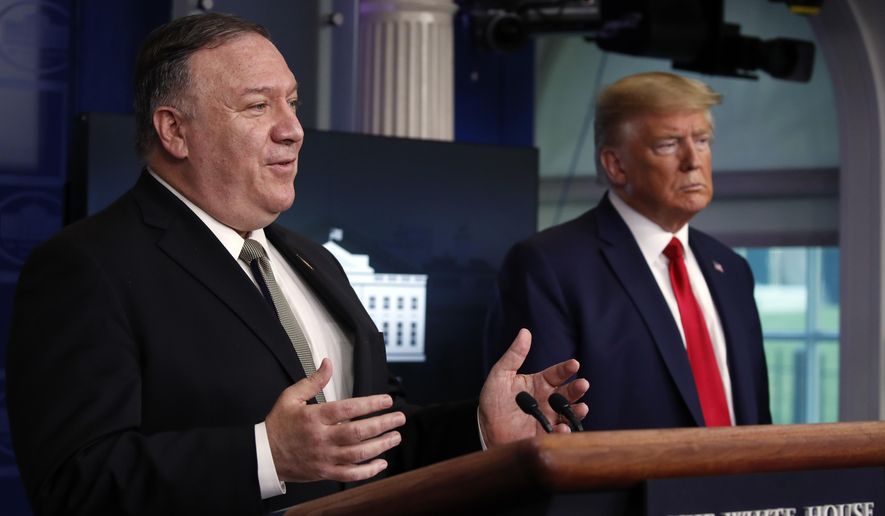Allies and foes alike rejected the Trump administration’s effort over the weekend to reimpose global economic sanctions on Iran, setting up a high-stakes showdown at the United Nations that could again leave Washington abandoned on the world stage.
Secretary of State Mike Pompeo said Saturday night that the U.S. has officially triggered a “snapback” provision within the 2015 international nuclear deal with Iran. That move, he said, will reimpose a set of harsh U.N. sanctions on Tehran that had been lifted as part of the Obama-era agreement.
But other parties to the deal, including staunch American allies in Europe, say the U.S. has no standing because President Trump withdrew from the pact in 2018. They say the sanctions relief granted to Iran should remain in place.
The administration is debating the issue after a multifront effort to squeeze Iran politically and financially. Mr. Trump last week presided over historic diplomatic deals that Israel signed with the United Arab Emirates and Bahrain. He said other Arab nations, perhaps Middle Eastern power Saudi Arabia, could soon follow suit. Such a development would isolate Iran and deepen Tehran’s bitter divisions with other countries in the region.
The sanctions move also is setting the stage for a major American power play as Washington searches for ways to punish nations that do not support its Iran gambit.
U.S. officials argue that because Iran has violated terms of the nuclear deal and because the United Nations has not extended an arms embargo on Tehran set to expire next month, the world community should unite and reimpose all financial penalties.
“The Trump administration has always understood that the greatest threat to peace in the Middle East comes from Islamic Republic of Iran, whose violent efforts to spread revolution have killed thousands and upended the lives of millions of innocent people,” Mr. Pompeo said in a statement. “History shows appeasement only emboldens such regimes. Thus today, the United States welcomes the return of virtually all previously terminated U.N. sanctions on the Islamic Republic of Iran, the world’s leading state sponsor of terror and anti-Semitism.
“The United States expects all U.N. Member States to fully comply with their obligations to implement these measures,” he said.
Iran said the move is entirely illegitimate.
“The U.S. knows that its claim is empty, illegal and ineffective,” said Saeed Khatibzadeh, a spokesman for the Iranian Foreign Ministry, as quoted by the state-run Islamic Republic News Agency.
Iranian resistance leaders back the administration’s decision and say that snapping sanctions back into place will put pressure on leaders in Tehran.
“Faced with executions and massacres, the people of Iran urge the United Nations, and the U.N. Security Council in particular, to restore snapback sanctions stipulated” on Iran, said Maryam Rajavi, acting president of the Paris-based National Council of Resistance of Iran, which advocates for the overthrow of Iran’s government.
“Otherwise, [Iranian Supreme Leader Ayatollah Ali Khamenei] will continue to ravage the nation as his regime’s survival depends on murder and suppression,” she said Friday at the group’s Trans-Atlantic Summit on Iran Policy, a virtual event that included speeches by current and former American political officials.
For the U.S. and its sanctions effort, it’s unclear exactly what happens next. The issue is expected to dominate discussion this week at the annual U.N. General Assembly, which is being held virtually this year because of the COVID-19 pandemic.
A U.S. effort to extend the arms embargo on Iran failed in a U.N. Security Council vote. An American push to reimpose sanctions seems headed for a similar fate because virtually all other stakeholders oppose Washington.
U.N. Secretary-General Antonio Guterres told Security Council members over the weekend that he cannot take any action on the issue, according to Reuters, suggesting that the international body is mostly unified in opposition to the U.S. China and Russia strongly oppose the administration’s position.
Even America’s closest allies have made clear where they stand. Britain, France and Germany wrote in a joint letter over the weekend that the administration’s move “is incapable of having legal effect and so cannot bring in to effect the procedure.”
“It flows from this that any decisions and actions which would be taken based on this procedure or on its possible outcome would also be incapable of having any legal effect,” wrote the three nations, all of which remain committed to the 2015 nuclear deal and have tried to salvage it.
The administration seems to have several tools at its disposal. Mr. Trump reportedly is planning an executive order that would punish any nation engaging in conventional weapons deals with Iran. Such an order could help keep some provisions of the Iran arms embargo in place after it formally expires next month.
Specialists also say Washington could seek separate penalties for countries that don’t recognize the return of U.N. sanctions.
“Any country that refuses to abide by the reimposed restrictions may tangle with the full weight of U.S. secondary sanctions,” said Andrea Stricker, a research fellow at the Foundation for Defense of Democracies.
Critics of the European position say Britain, France and Germany are standing in the way because they want to make money doing business with Iran.
“It’s an act, really, of supreme cowardice,” former New York Mayor Rudolph W. Giuliani said Friday night at the virtual gathering of the National Council of Resistance of Iran. “All these European governments claim to be dedicated to freedom and democracy and the love of human rights, and wanting to see a world in which people are treated fairly and decently. … The French have abandoned those principles; so have many other European countries.
“I don’t understand it, except greed,” he said.
• Ben Wolfgang can be reached at bwolfgang@washingtontimes.com.




Please read our comment policy before commenting.